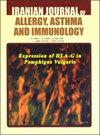PD-1/PD-L1 Interaction Regulates BCL2, KI67, BAX, and CASP3, Altering Proliferation, Survival, and Apoptosis in Acute Myeloid Leukemia
IF 1.2
4区 医学
Q4 ALLERGY
Iranian journal of allergy, asthma, and immunology
Pub Date : 2023-11-07
DOI:10.18502/ijaai.v22i5.13998
引用次数: 0
Abstract
Programmed death ligand‑1 (PD‑L1) is a pivotal inhibitory checkpoint ligand known to induce T-cell exhaustion via interaction with the programmed death‑1 (PD‑1) receptor. Beyond this, PD-L1’s intrinsic signaling pathways within cancer cells warrant further exploration. This study aims to elucidate the effect of PD-L1 stimulation on the proliferation, survival, and apoptosis of acute myeloid leukemia (AML) cell lines. Two human AML cell lines, HL-60 and THP-1 were cultured and treated with phorbol 12-myristate 13-acetate (PMA) to induce PD-L1overexpression. Post-treatment PD-L1 expression was confirmed via flow cytometry. Subsequently, cell surface PD-L1 was stimulated using a recombinant PD-1, 24 hours post-PMA treatment. The expression alterations in pivotal genes including BCL2, MKI67, BAX, and CASP3 were monitored using quantitative real-time polymerase chain reaction 24 and 48 hours post-treatment. Additionally, annexin-V through flow cytometry. Findings reveal that PD-L1 stimulation augments AML cell proliferation and survival by enhancing MKI67 and BCL2 expressions while concurrently inhibiting cell apoptosis due to decreased BAX and CASP3 expression following PD-L1 stimulation. Notably, stimulated cells expressed exhibited reduced annexin-V compared to control cells. This study underscores that PD-L1 stimulation fosters AML cell proliferation and survival while impeding cell apoptosis. The results hold potential implications for targeting PD-L1 in AML treatment strategies.PD-1/PD-L1相互作用调节BCL2、KI67、BAX和CASP3,改变急性髓性白血病的增殖、存活和凋亡
程序性死亡配体- 1 (PD - L1)是一种关键的抑制检查点配体,已知通过与程序性死亡- 1 (PD - 1)受体相互作用诱导t细胞衰竭。除此之外,PD-L1在癌细胞内的内在信号通路值得进一步探索。本研究旨在阐明PD-L1刺激对急性髓性白血病(AML)细胞系增殖、存活和凋亡的影响。培养2株人AML细胞株HL-60和THP-1,用PMA诱导pd - l1过表达。流式细胞术检测PD-L1表达。随后,在pma处理24小时后,用重组PD-1刺激细胞表面PD-L1。在治疗后24和48小时,采用实时定量聚合酶链反应监测关键基因BCL2、MKI67、BAX和CASP3的表达变化。此外,通过流式细胞术检测annexin-V。
研究结果表明,PD-L1刺激通过增强MKI67和BCL2的表达来增强AML细胞的增殖和存活,同时由于PD-L1刺激后BAX和CASP3的表达降低而抑制细胞凋亡。值得注意的是,与对照细胞相比,受刺激细胞表达的annexin-V减少。
这项研究强调,PD-L1刺激促进AML细胞增殖和存活,同时阻碍细胞凋亡。这些结果对靶向PD-L1的AML治疗策略具有潜在的意义。
本文章由计算机程序翻译,如有差异,请以英文原文为准。
求助全文
约1分钟内获得全文
求助全文
来源期刊
CiteScore
2.60
自引率
6.70%
发文量
64
审稿时长
>12 weeks
期刊介绍:
The Iranian Journal of Allergy, Asthma and Immunology (IJAAI), an international peer-reviewed scientific and research journal, seeks to publish original papers, selected review articles, case-based reviews, and other articles of special interest related to the fields of asthma, allergy and immunology. The journal is an official publication of the Iranian Society of Asthma and Allergy (ISAA), which is supported by the Immunology, Asthma and Allergy Research Institute (IAARI) and published by Tehran University of Medical Sciences (TUMS). The journal seeks to provide its readers with the highest quality materials published through a process of careful peer reviews and editorial comments. All papers are published in English.

 求助内容:
求助内容: 应助结果提醒方式:
应助结果提醒方式:


